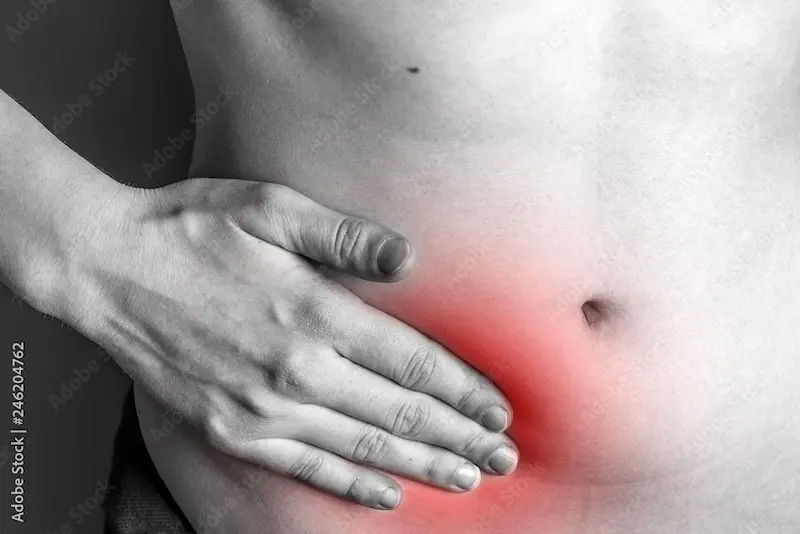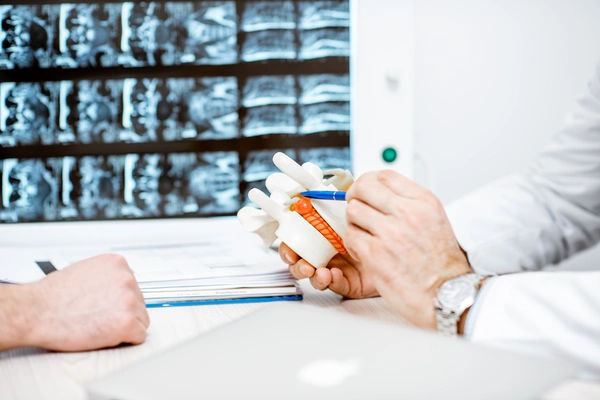Hiatal Hernia Overview and Treatment
Discover hiatal hernia, its causes, symptoms, and treatment options. Learn how this condition affects digestion and the available approaches for effective management.

Written by Dr. M L Ezhilarasan
Reviewed by Dr. Rohinipriyanka Pondugula MBBS
Last updated on 13th Jan, 2026

A hiatal hernia is a common condition that affects many people, often without them even realizing it. If you or a loved one has been diagnosed with a hiatal hernia, you may have questions about what it means, how it affects your health, and what treatment options are available. This article will help you understand the condition in simple terms and provide practical advice on managing it.
What is a Hiatal Hernia?
A hiatal hernia occurs when a part of your stomach pushes up through an opening in your diaphragm (the muscle that separates your chest from your abdomen) into your chest cavity. This opening is called the hiatus, which is why the condition is called a hiatal hernia.
There are two main types of hiatal hernias:
1. Sliding Hiatal Hernia (Type I) – The most common type, where the stomach and the lower part of the esophagus slide up into the chest.
2. Paraesophageal Hernia (Type II, III, IV) – Less common but more serious, where a portion of the stomach squeezes through the hiatus and sits beside the esophagus, sometimes leading to complications.
Consult a Top Gastroenterologist
What Causes a Hiatal Hernia?
The exact cause isn’t always clear, but certain factors can increase the risk:
- Age-related weakening of the diaphragm muscles
- Increased pressure in the abdomen due to obesity, pregnancy, heavy lifting, or chronic coughing
- Injury to the diaphragm
- Genetics – Some people are born with a larger hiatus
Symptoms of a Hiatal Hernia
Many people with a hiatal hernia have no symptoms at all. However, when symptoms do occur, they may include:
- Heartburn (burning sensation in the chest)
- Acid reflux (stomach acid flowing back into the esophagus)
- Difficulty swallowing
- Chest pain or discomfort
- Belching or bloating
- Feeling full quickly after eating
If you experience severe chest pain, vomiting, or difficulty swallowing, seek medical attention immediately, as these could indicate a serious complication.
How Does a Hiatal Hernia Affect Health?
Most hiatal hernias are harmless, but they can sometimes lead to complications such as:
- GERD (Gastroesophageal Reflux Disease) – Chronic acid reflux due to the hernia can damage the esophagus over time.
- Esophagitis – Inflammation of the esophagus from stomach acid.
- Strangulation (rare) – In paraesophageal hernias, part of the stomach can get trapped, cutting off blood supply (a medical emergency).
Diagnosing a Hiatal Hernia
If you have symptoms, your doctor may recommend:
- Barium Swallow X-ray – You drink a liquid that makes your digestive tract visible on X-rays.
- Endoscopy – A thin, flexible tube with a camera is passed down your throat to examine your esophagus and stomach.
- Esophageal Manometry – Measures muscle contractions in your esophagus.
- pH Monitoring – Checks acid levels in your esophagus.
If you need to schedule a test, you can easily book one through Apollo 24|7 for a convenient and hassle-free experience.
Treatment Options for Hiatal Hernia
Below are a few treatment options for Hiatal Hernia,
1. Lifestyle Changes (For Mild Cases)
Many people manage symptoms with simple adjustments:
- Eat smaller, more frequent meals – Large meals increase stomach pressure.
- Avoid trigger foods – Spicy, fatty, acidic, or fried foods can worsen reflux.
- Limit caffeine, alcohol, and carbonated drinks – These relax the lower esophageal sphincter (LES), allowing acid to escape.
- Maintain a healthy weight – Excess weight puts pressure on your abdomen.
- Avoid lying down after meals – Wait at least 2-3 hours before lying down.
- Elevate the head of your bed – Helps prevent nighttime reflux.
- Quit smoking – Smoking weakens the LES.
2. Medications
If lifestyle changes aren’t enough, your doctor may prescribe:
- Antacids – Provide quick relief by neutralizing stomach acid.
- H2 Blockers (e.g., Ranitidine, Famotidine) – Reduce acid production.
- Proton Pump Inhibitors (PPIs) (e.g., Omeprazole, Pantoprazole) – Stronger acid reducers for long-term management.
3. Surgery (For Severe Cases)
Surgery is rare but may be needed if:
- The hernia is large or causing complications.
- Symptoms don’t improve with medications.
Common surgical procedures include:
- Nissen Fundoplication – The upper part of the stomach is wrapped around the LES to strengthen it.
- Laparoscopic Repair – Minimally invasive surgery with small incisions and faster recovery.
When to See a Doctor?
Consult a doctor if:
- Symptoms persist despite lifestyle changes and medications.
- You experience severe pain, vomiting, or difficulty swallowing.
- You notice unintended weight loss.
If you need expert advice, you can book a consultation with a specialist through Apollo 24|7 for personalized care.
Final Thoughts
A hiatal hernia is usually manageable with the right approach. By making simple lifestyle changes, taking prescribed medications, and staying in touch with your doctor, you can keep symptoms under control and live comfortably. If you suspect you have a hiatal hernia or need guidance on managing it, don’t hesitate to reach out to a healthcare professional. Early attention can prevent complications and improve your quality of life.
Consult a Top Gastroenterologist
Consult a Top Gastroenterologist

Dr. Pavithra Ramakrishnan
Obstetrician and Gynaecologist
10 Years • MBBS, MS (OG), Diploma in Aesthetic (Cosmetic) Gynaecology
Chennai
Apollo Speciality Hospitals OMR, Chennai
(50+ Patients)

Dr. Kavya A
Obstetrician and Gynaecologist
11 Years • MBBS, DNB - obstetrics and gynaecology
Bengaluru
Apollo Clinic, JP nagar, Bengaluru

Dr Abdul Basith
Infertility Specialist
15 Years • MBBS & MD (OG) & MRCOG in UK & PD-FRM
Chennai
Apollo Women Hospitals Thousand Lights, Chennai
(25+ Patients)

Dr. Karuna Ratwani
Obstetrician and Gynaecologist
11 Years • MBBS, MS( Obstetrics & Gynaecology), F.MAS, FICRS Advanced Diploma in Minimal Access surgery Fellow of International College of Robotic Surgeons Diploma in Reproductive Medicine, Kiel-Germany Masters in Cosmetic Gynaecology , Greifswald-Germany Masterclass in Obstetrics & Gynaecology Ultrasound ( ISUOG, UK)
Delhi
Apollo Hospitals Indraprastha, Delhi

Dr. Nilanjana Das
Obstetrician and Gynaecologist
5 Years • MS (O&G)
Guwahati
Apollo Personalized Health Check Centre, Guwahati
Consult a Top Gastroenterologist

Dr. Pavithra Ramakrishnan
Obstetrician and Gynaecologist
10 Years • MBBS, MS (OG), Diploma in Aesthetic (Cosmetic) Gynaecology
Chennai
Apollo Speciality Hospitals OMR, Chennai
(50+ Patients)

Dr. Kavya A
Obstetrician and Gynaecologist
11 Years • MBBS, DNB - obstetrics and gynaecology
Bengaluru
Apollo Clinic, JP nagar, Bengaluru

Dr Abdul Basith
Infertility Specialist
15 Years • MBBS & MD (OG) & MRCOG in UK & PD-FRM
Chennai
Apollo Women Hospitals Thousand Lights, Chennai
(25+ Patients)

Dr. Karuna Ratwani
Obstetrician and Gynaecologist
11 Years • MBBS, MS( Obstetrics & Gynaecology), F.MAS, FICRS Advanced Diploma in Minimal Access surgery Fellow of International College of Robotic Surgeons Diploma in Reproductive Medicine, Kiel-Germany Masters in Cosmetic Gynaecology , Greifswald-Germany Masterclass in Obstetrics & Gynaecology Ultrasound ( ISUOG, UK)
Delhi
Apollo Hospitals Indraprastha, Delhi

Dr. Nilanjana Das
Obstetrician and Gynaecologist
5 Years • MS (O&G)
Guwahati
Apollo Personalized Health Check Centre, Guwahati




.webp)